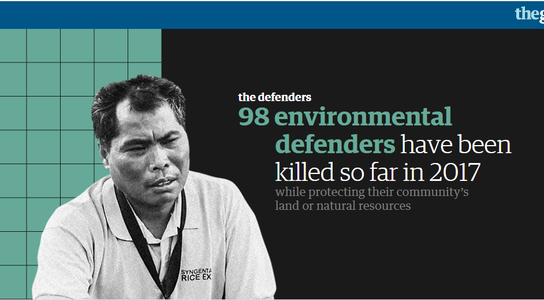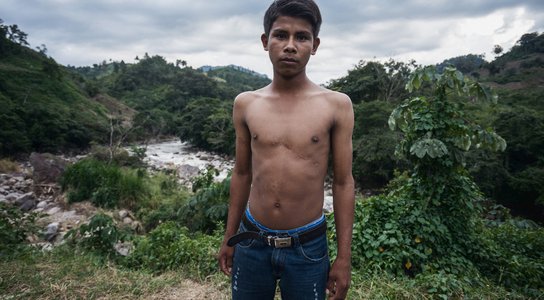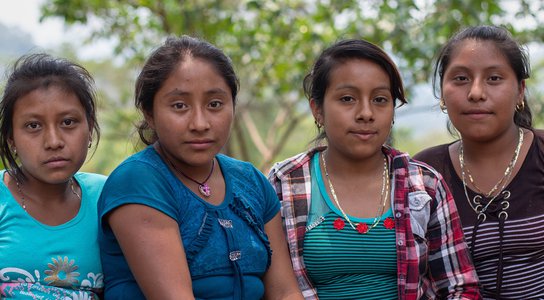It has never been deadlier to take a stand against companies that steal land and destroy the environment. Our new report Defenders of the Earth found that nearly four people were murdered every week in 2016 protecting their land and the natural world from industries like mining, logging and agribusiness.
Download the full report: Defenders of the Earth (PDF, 4.67 MB)
Murder is just one of a range of tactics used to silence land and environmental defenders, including death threats, arrests, sexual assault and aggressive legal attacks.
Jakeline Romero from Colombia (above, right) has faced years of threats and intimidation for speaking out against the devastating impacts of El Cerrejón, Latin America’s largest open-pit mine. Owned by London-listed companies Glencore, BHP Billiton and Anglo-American and run by a domestic operator, the project has been blamed for water shortages and mass displacement. (1)
This report tells the stories of countless people like Jakeline as they stand up to the might of multinationals, paramilitaries and even their own governments in the most dangerous countries on earth to be a defender. It also analyses why they are facing increased threats, and explores what can be done to keep activists safe.
They threaten you so you will shut up. I can’t shut up. I can’t stay silent faced with all that is happening to my people. We are fighting for our lands, for our water, for our lives - Jakeline Romero, Colombian land defender
Killings of defenders are not only growing, they’re spreading too. In 2016 we documented 200 killings across 24 countries, compared to 185 across 16 in 2015. Almost 40% of those murdered were indigenous. A lack of prosecutions also makes it hard to identify those responsible, but we found strong evidence that the police and military were behind at least 43 killings, with private actors such as security guards and hitmen linked to 52 deaths.
Deadliest countries for activistsThe ruthless scramble for the Amazon’s natural wealth makes Brazil, once again, the world’s deadliest country in terms of sheer numbers killed, though Honduras remains the most dangerous country per capita over the past decade.
Nicaragua is beginning to rival that dubious record. An inter-oceanic canal is set to slice the country in two, threatening mass displacement, social unrest and the violent suppression of those who stand against it. A voracious mining industry makes the Philippines stand out for killings in Asia.
In Colombia, killings hit an all-time high, despite – or perhaps because – of the recently signed peace deal between the government and the guerrilla group, the FARC. Areas previously under guerrilla control are now eyed enviously by extractive companies and paramilitaries, while returning communities are attacked for reclaiming land stolen from them during half a century of conflict.
India has seen killings spike against a backdrop of heavy-handed policing and the repression of peaceful protests and civic activism.
Defending national parks is now riskier than ever, particularly in Africa where large numbers of rangers are being killed, especially in the Democratic Republic of Congo.
And this isn’t a problem confined to any one corner of the planet. Developed countries are ramping up other methods to suppress activists, notably in the US, where environmental defenders are being given every reason to protest by the Trump administration.
It is increasingly clear that, globally, governments and business are failing in their duty to protect activists at risk. They are permitting a level of impunity that allows the vast majority of perpetrators to walk free, emboldening would-be assassins. Investors, including development banks, are fueling the violence by backing projects that harm the environment and trample human rights.
Ironically, it is the activists themselves who are painted as criminals, facing trumped-up criminal charges and aggressive civil cases brought by governments and companies seeking to silence them. This criminalisation is used to intimidate defenders, tarnish their reputations and lock them into costly legal battles.
Protect those on the frontlineIn Defenders of the Earth, we urge governments, companies and investors to take steps to:
- Tackle the root causes of risk – guaranteeing communities can make free and informed choices about whether and how their land and resources are used
- Support and protect defenders - through specific laws, policies and practices
- Ensure accountability for abuses – going beyond prosecuting those responsible for ordering or carrying out an attack, by ensuring that those actors, like international investors, who failed to support threatened defenders face consequences for their inaction
Download the full report: Defenders of the Earth (PDF, 4.67 MB)
(1) The local operator Cerrejón has denied causing water shortages and condemned threats suffered by activists.


